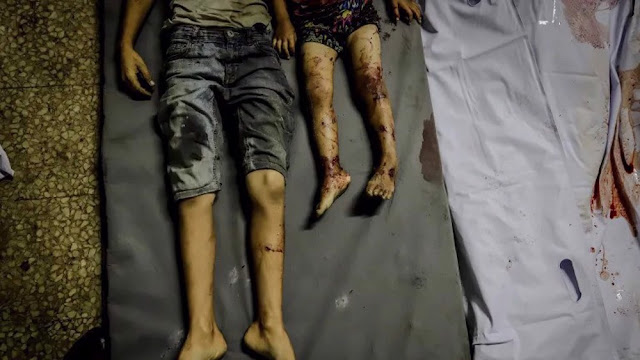In a strongly worded joint statement issued on Friday, August 29, 2025, the foreign ministers of Iceland, Ireland, Luxembourg, Norway, Slovenia, and Spain condemned Israel’s recent military offensive in the Gaza Strip and its declared intention to establish a permanent presence across the besieged Palestinian territory. The ministers expressed deep concern over the escalating violence, warning that the intensification of military operations would lead to catastrophic consequences, including the deaths of countless innocent Palestinian civilians, among them women, children, and the elderly.
The bodies of Palestinians are taken to Shifa Hospital in Gaza City for funeral procedures. (file)
The statement represents a unified European stance against what the ministers described as egregious violations of international law and humanitarian principles, calling for an immediate cessation of hostilities and a reconsideration of Israel’s military strategy.
Escalation of Violence and Civilian Toll
The Israeli military’s latest offensive in Gaza has drawn widespread international criticism due to its devastating impact on an already vulnerable population. According to the Palestinian Health Ministry, more than 50 Palestinians have been killed in Israeli bombardments across Gaza since dawn on Friday, with at least seven of the victims identified as individuals seeking humanitarian aid. The ministry also reported that five additional civilians, including two children, succumbed to starvation in the past 24 hours alone, highlighting the dire humanitarian crisis gripping the region. Since October 2023, Israel’s military campaign in Gaza has resulted in the deaths of over 63,000 Palestinians, with nearly 159,500 others injured, according to Gaza’s health authorities. These staggering figures underscore the scale of the devastation and the urgent need for intervention to prevent further loss of life.
The European ministers’ statement specifically condemned the “intolerable deaths of innocent Palestinian civilians” caused by the intensification of military operations. They expressed alarm over the Israeli military’s plans to advance on Gaza City, the largest urban center in the Gaza Strip, which is currently home to approximately one million displaced Palestinians seeking refuge. Global appeals to halt this advance have emphasized the potential for massive civilian casualties and further displacement, which could exacerbate an already catastrophic humanitarian situation. The ministers described the prospect of such an operation as “unacceptable,” urging Israel to reconsider its actions and prioritize the protection of civilian lives.
Forced Displacement and Violations of International Law
A central focus of the joint statement was the forced displacement of Palestinians, which the ministers labeled a “flagrant violation of international law.” The systematic displacement of Palestinian civilians, driven by military operations and the destruction of infrastructure, has left hundreds of thousands without homes or access to basic necessities. Up to 800,000 Palestinians are currently enduring catastrophic conditions marked by starvation, destitution, and death, according to the statement. The ministers highlighted the deliberate destruction of essential civilian infrastructure, including locations serving as shelters for displaced individuals, as a particularly egregious act that contravenes international humanitarian law.
The statement underscored the legal and moral obligations of Israel, as the occupying power, to ensure the safety and well-being of civilians in Gaza. The ministers called for an immediate end to actions that displace Palestinians and destroy critical infrastructure, such as hospitals, schools, and water facilities, which are vital for sustaining life in the besieged territory. They also demanded that Israel allow unimpeded access for United Nations agencies and non-governmental organizations (NGOs) to deliver humanitarian aid to those in need. The blockade of Gaza, coupled with restrictions on aid delivery, has significantly worsened the humanitarian crisis, leaving millions without access to food, clean water, medical care, or shelter.
Famine and Humanitarian Crisis
The confirmation of famine in Gaza was a focal point of the ministers’ condemnation, with the statement expressing horror at the starvation crisis affecting hundreds of thousands of Palestinians. The famine, coupled with the ongoing violence, has created a humanitarian catastrophe of unprecedented proportions. The Palestinian Health Ministry’s report of civilians, including children, dying of starvation in recent days serves as a grim reminder of the consequences of prolonged conflict and restricted aid access. The ministers emphasized that Israel, as the occupying power, bears responsibility for upholding its humanitarian obligations under international law, including ensuring that adequate food, water, and medical supplies reach the civilian population.
The European diplomats called for urgent action to address the famine and alleviate the suffering of Gaza’s residents. They urged Israel to lift restrictions on humanitarian aid and allow UN agencies and NGOs to operate freely in the region. The statement also highlighted the need for international cooperation to address the root causes of the crisis, including the ongoing blockade and military operations that have crippled Gaza’s economy and infrastructure. The ministers stressed that the international community must work collectively to provide immediate relief and long-term solutions to prevent further deterioration of the situation.
Settlement Expansion and Violence in the West Bank
In addition to condemning the military offensive in Gaza, the joint statement addressed the escalating violence in the occupied West Bank, particularly the expansion of Israeli settlements and rising attacks by Israeli settlers against Palestinian communities. The ministers expressed deep concern over the continued construction of settlements, which they described as illegal under international law and a major obstacle to peace. The expansion of settlements has been accompanied by an increase in settler violence, including attacks on Palestinian homes, farmland, and infrastructure, further exacerbating tensions in the region.
The ministers called for an end to settlement expansion and accountability for acts of violence perpetrated by settlers. They emphasized that the international community would not remain silent in the face of human rights violations, signaling a commitment to holding Israel accountable for actions that undermine the prospects for a just and lasting peace. The statement underscored the need for all parties to respect international law and work toward de-escalation, dialogue, and a resolution that upholds the rights and dignity of both Palestinians and Israelis.
International Response and Calls for Accountability
The joint statement from Iceland, Ireland, Luxembourg, Norway, Slovenia, and Spain reflects a growing international consensus on the need to address the humanitarian crisis in Gaza and hold Israel accountable for its actions. The ministers’ call for Israel to cease its military operations and reconsider its decision to establish a permanent presence in Gaza aligns with broader global appeals for de-escalation and respect for international law. The statement also signals a willingness among European nations to take a more assertive stance in response to the crisis, emphasizing that human rights violations will not go unchallenged.
The international community’s response to the situation in Gaza has been marked by a mix of condemnation, diplomatic pressure, and calls for humanitarian intervention. The United Nations and various human rights organizations have repeatedly urged Israel to end its military operations and lift restrictions on aid, warning of the catastrophic consequences of continued violence. The European ministers’ statement adds to this chorus, highlighting the urgency of addressing the famine, displacement, and destruction in Gaza while advocating for a broader resolution to the Israeli-Palestinian conflict.
Context of the Conflict
The current escalation in Gaza is part of a broader conflict that has persisted for decades, rooted in competing claims to land, sovereignty, and self-determination. Since October 2023, Israel’s military campaign in Gaza has been one of the deadliest phases of the conflict, with unprecedented levels of destruction and loss of life. The Israeli government has justified its actions as a response to security threats, including rocket attacks and other forms of violence emanating from Gaza. However, the scale and intensity of the military response, coupled with the blockade and restrictions on aid, have drawn widespread criticism for their disproportionate impact on civilians.
The blockade of Gaza, in place for nearly two decades, has severely restricted the movement of goods and people, leading to economic collapse and widespread poverty. The destruction of infrastructure, including power plants, water systems, and medical facilities, has further compounded the suffering of Gaza’s 2.3 million residents, the majority of whom are refugees or descendants of refugees displaced during earlier conflicts. The current offensive, combined with the announcement of a permanent Israeli presence in Gaza, has raised fears of a long-term occupation that could further entrench the cycle of violence and suffering.
Broader Implications
The European ministers’ statement carries significant implications for the international response to the Israeli-Palestinian conflict. By explicitly condemning Israel’s actions and calling for accountability, the statement challenges the status quo and signals a shift toward greater scrutiny of Israel’s policies in the occupied territories. It also underscores the importance of multilateral cooperation in addressing humanitarian crises and upholding international law. The ministers’ emphasis on the need for dialogue and de-escalation reflects a broader recognition that military solutions alone cannot resolve the underlying issues driving the conflict.
For the people of Gaza, the immediate priority is survival. The famine, displacement, and ongoing violence have created a humanitarian emergency that demands urgent action. The European ministers’ call for unrestricted humanitarian aid and an end to military operations aligns with the needs of Gaza’s residents, who are facing starvation, homelessness, and a lack of basic services. However, achieving lasting change will require sustained international pressure, diplomatic engagement, and a commitment to addressing the root causes of the conflict, including the occupation, blockade, and systemic inequalities.
Conclusion
The joint statement from the foreign ministers of Iceland, Ireland, Luxembourg, Norway, Slovenia, and Spain represents a powerful condemnation of Israel’s latest offensive in Gaza and its plan to establish a permanent presence in the territory. By highlighting the catastrophic humanitarian consequences, including famine, displacement, and the destruction of civilian infrastructure, the ministers have underscored the urgency of addressing the crisis. Their call for Israel to cease military operations, allow humanitarian aid, and respect international law reflects a broader commitment to human rights and accountability.
As the situation in Gaza continues to deteriorate, the international community faces a critical test of its ability to respond effectively to one of the most pressing humanitarian crises of our time. The European ministers’ statement serves as a reminder that silence in the face of human rights violations is not an option. With over 63,000 Palestinians killed and nearly 160,000 injured since October 2023, the need for immediate action to alleviate suffering and address the underlying causes of the conflict has never been more urgent. The path forward requires not only humanitarian intervention but also a renewed commitment to dialogue, justice, and a vision for peace that respects the rights and dignity of all people in the region.







